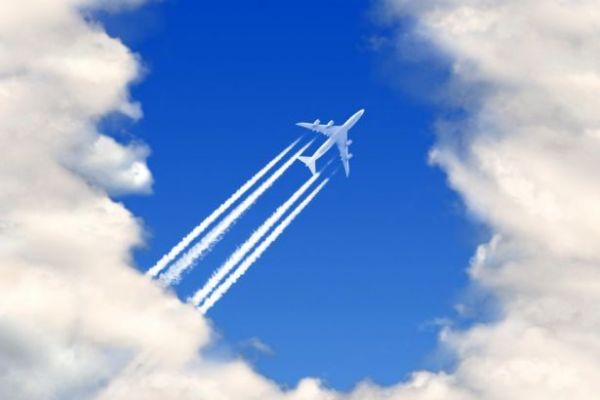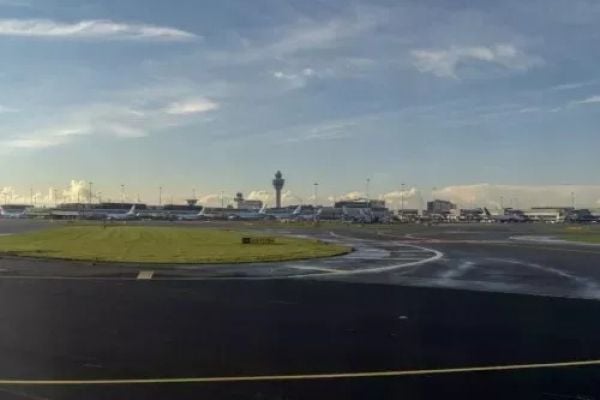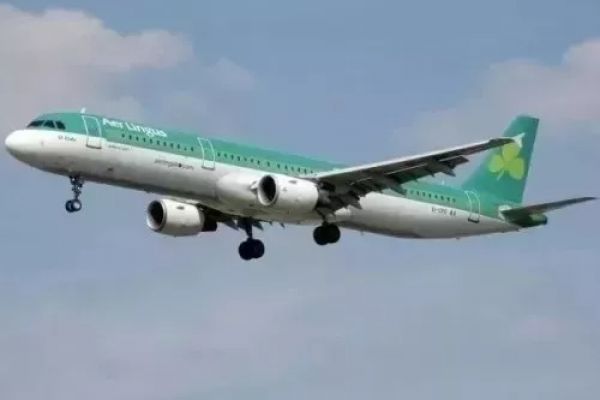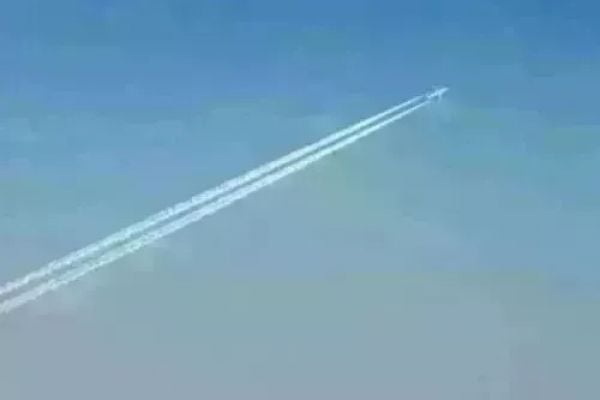Russia has closed its airspace to airlines from 36 countries, including all 27 members of the European Union, in response Ukraine-related sanctions targeting its aviation sector.
Some of the banned countries had already been identified, while others were named by the aviation authority Rosaviatsia for the first time on Monday following the punitive measures imposed over Russia's invasion of Ukraine.
The flight bans are expected to hurt airlines that fly over the world's biggest country to get from Europe to Asia. They are likely to force them to find new routes.
Rosaviatsia said that flights from those countries could in exceptional circumstances be authorised if they secure special clearance from Russia's aviation authority or foreign ministry.
It listed the countries as Albania, Anguilla, Austria, Belgium, Bulgaria, British Virgin Islands, Germany, Gibraltar, Hungary, Greece, Denmark, Canada, Croatia, Cyprus, Czech Republic, Estonia, Finland, France, Jersey, Ireland, Iceland, Italy, Latvia, Lithuania, Luxembourg, Malta, the Netherlands, Norway, Poland, Portugal, Romania, Slovakia, Slovenia, Spain, Sweden and the United Kingdom.
Russian President Vladimir Putin has called the invasion of Ukraine a "special operation" and justified it by saying "neo-Nazis" rule the country and threaten Russia's security - a charge Kyiv and Western governments say is baseless propaganda.
Russia Sanctions Snarl Flights, Compound Airline Industry Woes
The above news was followed by news that airlines are bracing for potentially lengthy blockages of key east-west flight corridors after the European Union and Moscow issued tit-for-tat airspace bans and Washington did not rule out similar action in response to Russia's invasion of Ukraine.
Industry officials say the Biden administration would ban Russia from US airspace. The White House said on Monday 28 Febraury while barring Russian flights was not off the table, it had yet to make a decision.
"There are a lot of flights that US airlines fly over Russia to go to Asia and other parts of the world and we factor in a range of factors," White House spokesperson Jen Psaki told reporters.
The issue has been a subject of intense US government discussions in recent days. Senator Dick Durbin, the second-highest ranking Democrat in the US Senate, voiced his support for the ban.
"Other countries have done it in Europe and turning the lights out at the airport on those guys isn't a bad idea," he told reporters.
A European official, who asked not to be identified, said that the EU had full confidence Washington would follow suit.
US.Representative Carlos Gimenez, a Republican member of the House Transportation and Infrastructure Committee, said on Twitter that he would file legislation this week to ban Russian-operated airlines and private jets from flying in US airspace.
A move by the White House to ban Russia's carriers is expected to provoke a response from Moscow, which could affect carriers like United Airlines UAL.O. The Chicago-based carrier, for example, uses Russian airspace for flights from Delhi.
American Airlines said it was not using any Russian airspace for international flights and it would suspend interline deals with Russian carriers Aeroflot and S7 Airlines indefinitely.
As stated above, Russia on Monday February 28 banned airlines from 36 countries including all 27 members of the European Union after EU ministers agreed to refuse entry to Russian airplanes including the private jets of the country's oligarchs.
In one of the first signs of differences in European ranks, the chairman of Italy's civil aviation authority called the airspace sanctions against Russia a violation of international treaties.
The European official, however, said the EU's sanctions were "carefully crafted in line with international law."
The sanctions have sparked flight cancellations and costly detours, denting the industry's pandemic recovery and dealing a blow to the mainly Ireland-based leasing industry which was ordered to stop doing business with Russian airlines.
The rerouting meant that flights in Kazakhstan's airspace tripled to more than 450 on Monday 28 February.
Without access to Russia's airspace, many carriers will have to divert flights south while also avoiding areas of tension in the Middle East.
Finnish national carrier Finnair FIA1S.HE cancelled flights to Japan, Korea, China and Russia and scrapped 2022 guidance, as sanctions block access to Asia - a cornerstone of its strategy in recent years due to its Helsinki hub's location.
Shares in Finnair plunged 21%, leading a retreat in airline stocks in both Europe and the United States.
Germany's Lufthansa LHAG.DE group said 30 flights to Russia would be cancelled this week and flights from Europe to Tokyo and Seoul would have to fly detours.
Russia's Aeroflot AFLT.MM said that it has cancelled flights to the United States, Mexico, Cuba and the Dominican Republic through Wednesday due to the closure of Canadian airspace. The announcement came a day after the carrier said that it would cancel all flights to European destinations.
On Monday 28 February, an Aeroflot jet headed to Verona in Italy was forced to enter a holding pattern outside EU airspace and was diverted to Turkey after apparently being refused access, according to flightradar24.
That came hours after one of its flights crossed Canadian airspace despite Toronto's ban on Russian planes, prompting a regulator to launch a review into the conduct of Aeroflot and Canada's air-traffic control service provider.
Disruption
Other carriers from Latvia's AirBaltic to Singapore Airlines SIAL.SI have also suspended flights to Russia.
Korean Air 003490.KS, Japan Airlines 9201.T and Japan's ANA Holdings 9292.T said they were continuing to use Russian airspace but had no plans to add flights to Russia or Europe to replace flights cancelled by European carriers.
Demand to Japan and South Korea has been low due to COVID-19-related travel restrictions.
Airspace shutdowns and flight cancellations also started to affect cargo traffic, further exacerbating global supply-chain woes.
Many cargo carriers use Russian airspace, which is a major intersection for global trade, about half of which by value is carried by air.
"Due to the ongoing dramatic developments in the Russia-Ukraine conflict, Lufthansa will no longer use Russian airspace," Lufthansa Cargo said.
US-based United Parcel Service Inc UPS.N and FedEx Corp FDX.N, two of the world's largest logistics companies, said they were halting deliveries to Russia.
More Supply Chain Pain As Airspace Closures Hit Air Cargo
All of the above news was followed by news that global supply chains, already hit hard by the COVID-19 pandemic, face new disruption and cost pressure as airspace bans following Russia's invasion of Ukraine raise concerns over a fifth of air freight.
Transport between Europe and north Asian destinations like Japan, South Korea and China is in the front line of disruption after reciprocal bans barred European carriers from flying over Siberia and prevented Russian airlines from flying to Europe.
Airlines responsible for moving around 20% of the world's air cargo are affected by those bans, Frederic Horst, managing director of Cargo Facts Consulting, told Reuters on Tuesday.
Germany's Lufthansa LHAG.DE, Air France KLM AIRF.PA, Finnair FIA1S.HE and Virgin Atlantic have already cancelled north Asian cargo flights over closed access to airspace.
Major Asian carriers like Korean Air Lines 003490.KS and Japan's ANA Holdings 9202.T are still using Russian airspace, however, as are Middle Eastern airlines.
Shares in German logistics firm Deutsche Post DPWGn.DE fell almost 3% on Tuesday 1 March. Major airline shares fell around 1%.
Pure cargo carriers like Russia's AirBridgeCargo Airlines and Luxembourg's Cargolux are subject to the bans in a move that could send air freight rates - already elevated due to a lack of passenger capacity during the pandemic - soaring further.
"The flights become more expensive due to the longer routes," said Stefan Maichl, analyst at Germany's Landesbank Baden-Wuerttemberg.
"With more kerosene on board, the cargo capacity decreases. Freight rates could increase further as a result."
In December, air cargo rates were 150% above 2019 levels, according to the International Air Transport Association, spurring inflation that has rocked economies around the world.
Sanctions imposed on Russia in the wake of its Ukraine invasion are expected to further disrupt global supply chains.
Russia's AirBridgeCargo alone moves just under 4% of global international air cargo, with most of that between Europe and Asia, Horst said.
"All up you could be looking at perhaps a quarter of air cargo between Asia and Europe needing to find alternate means of transportation," Horst said.
"Yields are high enough that flying a longer route via Southeast Asia, South Asia or the Middle East is an option, but it will still pull capacity out of the market."
E-commerce surged during the pandemic. Shipping container shortages and port bottlenecks led to more products being flown by air. Demand for air cargo last year was 6.9% above 2019 levels, according to IATA.
Taiwan's EVA Airways 2618.TW said on Tuesday 1 March that its cargo flights to and from Europe were operating normally and it would consider adding more services to meet market demand.
China Airlines 2610.TW, also based in Taiwan, said that it would continue to pay attention to the global economic and political situation and flexibly adjust cargo capacity.
Asia-North America cargo routes are expected to be less affected than European routes, analysts say, because many carriers already use Anchorage, Alaska, as a cargo hub and stopover point.
Japanese automakers Toyota Motor Corp 7203.T and Nissan Motor Co 7201.T said on Tuesday they were keeping an eye on any disruption to supply chains as a result of what Russia calls its "special operation" in Ukraine.
US-based United Parcel Service Inc UPS.N and FedEx Corp FDX.X, two of the world's largest logistics companies, have halted deliveries to Russia. Deutsche Post said its DHL unit was halting inbound shipments to Russia.
News by Reuters, edited by Hospitality Ireland. Click subscribe to sign up for the Hospitality Ireland print edition.









